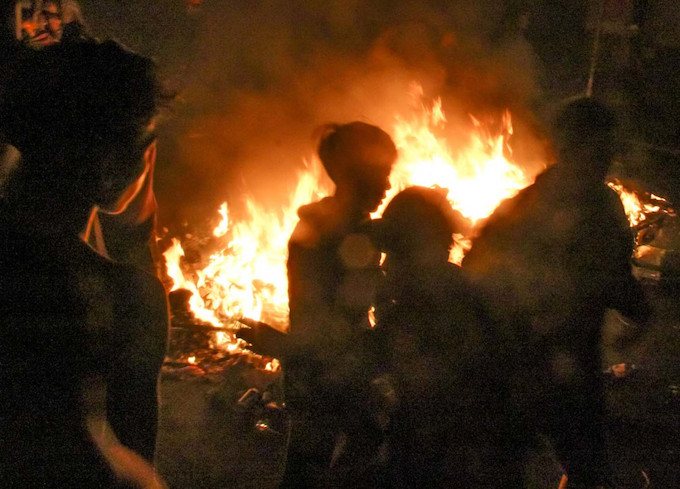Protests to challenge the presidential election results have escalated in the capital of Jakarta for two nights running. Video: Jakarta Post
Pacific Media Centre Newsdesk
Jakarta Governor Anies Baswedan says six people have been killed during the worst riots to hit Indonesia’s capital city since 1998, when a student rally demanding the ouster of then-president Suharto led to a deadly riot that killed thousands.
The riots over two nights broke out in Jakarta shortly after supporters of losing presidential candidate Prabowo Subianto took to the streets on Tuesday to protest against the results of the April 17 election, which they claimed were plagued with fraud, reports The Jakarta Post.
“Six people have died so far; two at Tarakan Hospital and [the others] at the hospitals Pelni, Budi Kemulyaan, Cipto Mangunkusumo and RSAL Mintoharjo,” Governor Baswedan said.
READ MORE: VP calls on Prabowo, Sandiaga to calm protesters down

The National Police confirmed that six people had died during the riots and said they were investigating the deaths.
“This has to be clarified. We don’t want [people] to speculate, since there is an attempt to provoke people by blaming the security apparatus and inciting public anger,” National Police chief General Tito Karnavian said.
The Jakarta Post reported it could only independently confirm the deaths of three people: two people reported by Tarakan Hospital in West Jakarta and one at Budi Kemuliaan Hospital in Central Jakarta.
The deceased were identified as 17-year-old Adam Nooryan, who lived in Tambora, West Jakarta, 17-year-old Widianto Rizky Ramadhan, who lived in Palmerah, West Jakarta and 30-year-old Farhan Syahfero, a resident of Depok, West Java.
Planned riots
The National Police believe the riots were orchestrated and said many of the arrested “provocateurs” came from outside Jakarta.
“We have detained 58 people suspected of being provocateurs of the riot,” Police spokesperson Inspector General M. Iqbal said at a press conference at the Office of the Coordinating Political, Legal and Security Affairs Minister in Central Jakarta.
“There are indications that most of the rioters were from outside Jakarta and that they had been paid [to riot].”
He said the initial protesters outside the headquarters of the Elections Supervisory Agency (Bawaslu) were peaceful and had cooperated with police.
“The protest coordinator asked for permission to break the fast together and perform tarawih (evening Ramadan prayers), which we allowed, even though the law states that protests should end by 6:30 pm.”
He added that police had asked the crowd to disperse at 9:00 pm, which it did without incident.
“But then, around 11:00 pm, another crowd of unknown origin arrived and started to damage the security barriers [in front of the Bawaslu headquarters],” he said.
Police then drove the crowd, which had started to throw projectiles such as rocks and Molotov cocktails at the security forces, back toward Tanah Abang.
After police had mostly subdued the crowd, another, separate group of people appeared and started attacking the National Police’s Mobile Brigade (Brimob) dormitories in Petamburan, Cental Jakarta, setting the building on fire.
“We found an ambulance with a political party logo that was filled with rocks and other tools,” Iqbal said, declining to name the party. “We also confiscated envelopes full of money.”
A series of post-election protests also took place in Pontianak, West Kalimantan, with an unidentified group of people setting fire to a police post on Wednesday.
Social media restrictions
The government took measures to slow down the uploading and downloading of photographs on social media platforms and online messaging apps following the rioting in Central and West Jakarta.
“To avoid provocations and false news from spreading to the wider public, we are temporarily limiting access to certain features on social media,” Coordinating Political, Legal and Security Affairs Minister Wiranto said at a press conference yesterday.
Communications and Information Minister Rudiantara said the sharing of videos and photos online had been blocked.
“The limitations are applied to features on social media platforms and messaging systems,” Rudiantara said at the same press conference. “We know that the modus operandi [of spreading false news] is by posting videos, memes and photos on Facebook, Instagram and Twitter.
These posts are screen-capped and go viral on messaging apps, such as WhatsApp. So we will all experience a slowdown if we try to download or upload videos and photos.”
He said the move was necessary because the fake videos and photos triggered an “emotional response.”
Jokowi wins election
The General Elections Commission (KPU) announced incumbent President Joko “Jokowi” Widodo as the winner of the 2019 presidential election early on Tuesday morning, giving the president a second and final term in office.
Jokowi captured 55.5 percent of the vote or over 85 million votes, 17 million more than rival Prabowo Subianto, who received over 68 million votes or 44.5 percent of the vote, reports The Jakarta Post.
The victory had been forecast by reputable pollsters in the country, including the Centre for Strategic and International Studies (CSIS) and Cyrus Network, which forecast his victory against Prabowo at 55.6-44.4.
Jokowi won 21 of 34 provinces while Prabowo won 13 provinces, most of which were in Sumatra.











































Most of them are not students. Those are groups of unemployed individuals with gang tattoos that are allegedly coordinated by some intellectuals to topple the incumbent’s government through so called “people power” (investigation is on going). I hope the title of this article could be further revised to avoid any further horizontal conflict among Indonesians because there could be some idiots out there that will use this article to provoke the masses by saying “6 students died in the protest”. Once again please further consider to revise this article.
Comments are closed.